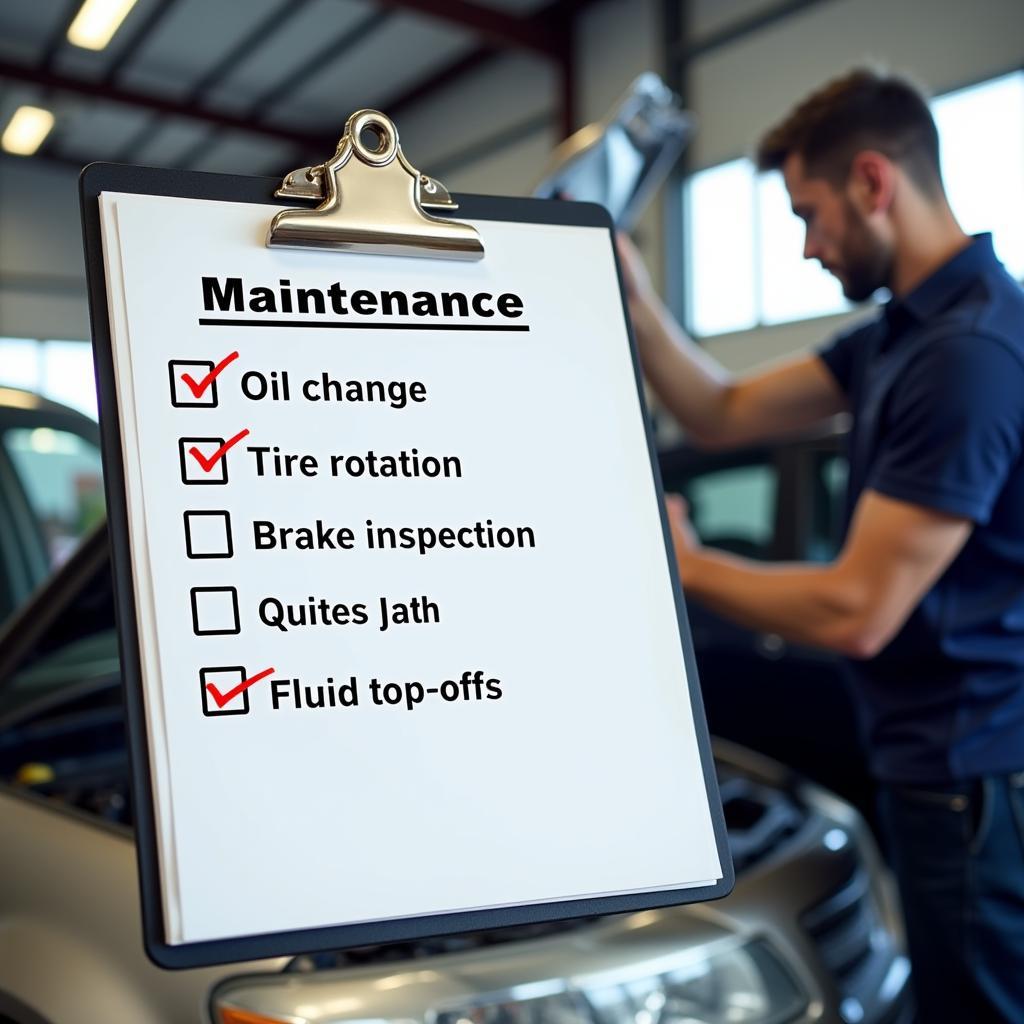Car Full Maintenance is essential for ensuring your vehicle’s longevity, reliability, and safety. It not only saves you money in the long run but also contributes to a smoother, more enjoyable driving experience. This guide will walk you through everything you need to know about keeping your car in peak condition.
Understanding Car Full Maintenance
Car full maintenance encompasses a range of services and checks performed regularly to prevent potential problems and address existing ones. It’s more than just changing the oil; it’s about proactively caring for every aspect of your vehicle. From the engine to the tires, a comprehensive maintenance plan covers all the crucial components. This includes routine checks, replacements, and repairs based on the manufacturer’s recommendations and your driving habits.
Why is Car Full Maintenance Important?
Regular car full maintenance offers numerous benefits:
- Enhanced Safety: Well-maintained vehicles are significantly safer, reducing the risk of accidents caused by mechanical failures.
- Improved Fuel Efficiency: A properly tuned engine consumes less fuel, saving you money at the pump.
- Extended Vehicle Lifespan: Regular maintenance prevents premature wear and tear, extending the life of your vehicle.
- Higher Resale Value: A well-maintained car commands a higher resale value in the used car market.
- Reduced Stress: Knowing your car is in good working order provides peace of mind and a more enjoyable driving experience.
 Car Full Maintenance Checklist
Car Full Maintenance Checklist
Key Components of Car Full Maintenance
A comprehensive car full maintenance plan includes the following key components:
- Regular Oil Changes: Engine oil is the lifeblood of your vehicle. Regular oil changes keep the engine lubricated, preventing friction and overheating.
- Tire Rotation and Balancing: Rotating tires ensures even wear and tear, extending their lifespan. Balancing prevents vibrations and improves handling.
- Brake Inspections and Replacements: Brakes are crucial for safety. Regular inspections and timely replacements are essential.
- Fluid Top-offs and Changes: Various fluids, such as coolant, brake fluid, and transmission fluid, need to be checked and topped off or changed regularly.
- Air Filter Replacement: A clean air filter ensures optimal engine performance and fuel efficiency.
- Spark Plug Replacement: Worn-out spark plugs can lead to reduced fuel efficiency and engine misfires.
- Battery Check and Replacement: A healthy battery is essential for starting your car and powering electrical components.
- Belt and Hose Inspections: Cracked or worn belts and hoses can lead to engine problems and should be inspected regularly.
What does car full maintenance include?
Car full maintenance includes all the necessary checks and services to keep your vehicle running smoothly, such as oil changes, tire rotations, brake inspections, and fluid top-offs.
How often should I get car full maintenance?
Refer to your owner’s manual for the recommended maintenance schedule. Generally, car full maintenance is recommended every 5,000 to 7,500 miles.
“Regular maintenance is like giving your car vitamins. It prevents small problems from becoming big, expensive headaches,” says John Smith, Senior Automotive Technician at Speedy Auto Repair.
Car Full Maintenance: DIY vs. Professional Service
While some maintenance tasks can be performed at home, others require specialized tools and expertise. Knowing when to DIY and when to seek professional help is crucial.
What are the benefits of DIY car maintenance?
DIY car maintenance can save you money and give you a sense of accomplishment. However, it requires some mechanical knowledge and the right tools.
When should I take my car to a professional mechanic?
Complex repairs, such as engine work or transmission repairs, are best left to qualified mechanics. They have the necessary expertise and tools to diagnose and fix complex issues.
“Don’t underestimate the value of a skilled mechanic. Their experience can save you time and money in the long run,” advises Maria Garcia, Certified Automotive Instructor at Apex Automotive Institute.
Conclusion
Car full maintenance is a crucial investment in your vehicle’s health, safety, and longevity. By adhering to a regular maintenance schedule and addressing potential issues promptly, you can ensure a smooth, reliable, and enjoyable driving experience for years to come. Remember, a little preventative maintenance goes a long way! Need help with your car full maintenance? Contact AutoTipPro at +1 (641) 206-8880 or visit our office at 500 N St Mary’s St, San Antonio, TX 78205, United States.
FAQ
- What is included in a car full maintenance service? A car full maintenance service typically includes oil changes, tire rotations, brake inspections, fluid top-offs, and other essential checks.
- How often should I get my car serviced? Consult your owner’s manual for the recommended maintenance schedule.
- Can I perform car full maintenance myself? Some tasks can be performed at home, while others require professional expertise.
- What are the benefits of regular car maintenance? Regular maintenance improves safety, fuel efficiency, and extends the lifespan of your vehicle.
- How can I find a reliable mechanic? Ask for recommendations from friends and family or check online reviews.
- What are some signs that my car needs maintenance? Unusual noises, leaks, or warning lights on the dashboard are signs that your car needs attention.
- How much does car full maintenance cost? The cost varies depending on the make and model of your vehicle and the services performed.




Leave a Reply